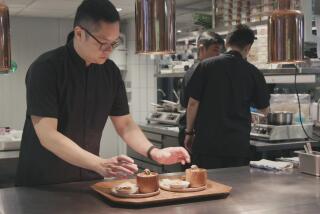Maverick Malaysian Minister’s Unorthodox Schemes Stir People and the Economy
- Share via
KUALA LUMPUR, Malaysia — An ancient Malaysian folk belief had it that drinking coconut water weakened the libido.
As a result, Malaysia’s supply of coconuts far outstripped demand, forcing the government to fork out more than $5 million each year in production subsidies as Malaysian men, young and old, anxious to preserve their virility, shunned the drink.
Until, that is, the arrival of Agriculture Minister Sanusi Junid, politician, linguist, drinker of coconut water--and father of seven.
Known for his maverick ideas, Malaysia’s high priest of unorthodoxy hit on a scheme that became so successful that not only were the subsidies withdrawn, but demand rose so quickly that coconuts have now become costly.
First he staged an international coconut tree climbing contest in 1987 to glamorize coconut-picking.
“It showed everyone it was not just a monkey’s job,” the bespectacled and balding former banker, who speaks four languages, explained in an interview.
Then he brought along on his promotion trips to villages a coconut water drinker “well over a hundred years old and great-grandfather many times over” who helped persuade many younger men that their virility would not be affected.
“I’m really just trying to be practical and try to do everything step by step. I believe that whatever you do, you should do your best,” Sanusi said.
Since taking over the Agriculture Ministry in 1986, he has carried that maxim to hilarious limits sometimes, hatching schemes that have drawn both laughter and skepticism from other Cabinet ministers and Malaysians at large.
In the end, however, Sanusi almost always has had the last laugh.
“I make most of my decisions based on banking strategy,” he said, adding that he wanted to see wealth from the resource-rich, predominantly Muslim country of 17 million trickling down to rural Malaysians, some of whom still live below the poverty level.
Concerned that the fish population off Malaysia’s coast was falling, he embarked on a nationwide campaign to collect more than a million used car tires that were tied together to make artificial reefs to attract fish.
More than 50 such rubber reefs have been built, helping to reduce sharply Malaysia’s fish imports, he said.
Sanusi is also persuading farmers to try out “double-decker” rice fields in which the crop is planted on the ground and in suspended concrete basins.
He has started cooking classes to introduce international cuisine to village women, bringing them by busloads to Kuala Lumpur, the capital, where they are taught in two weeks how to whip up Hungarian goulash and spaghetti Bolognese.
“Why should Malaysians be trapped by a curry culture,” Sanusi asks. “When these people return to their kampongs (villages) after the courses they become the envy of their neighbors.”
With the eyebrows of his skeptics still raised, Sanusi recently announced his latest brainstorm--an “Eat Rabbit Meat Campaign.”
He has gone on television promotions stir-frying rabbit meat, eating barbecued rabbit and doffing rabbit-fur hats to achieve his vision of turning Malaysia into a major world exporter of rabbit meat and products.
“I was undergoing an operation for my heart problem in San Francisco when I read that rabbits were one of the cleanest animals, totally vegetarian (in their diet) and had less cholesterol than chickens,” he recalled.
“It can be eaten by all races, unlike pork and beef which is forbidden by Muslims and Hindus,” he said.
“Rabbits should be (raised) in schools for food. If schoolchildren get used to eating rabbit meat, it can become a national dish,” Sanusi added.
Sanusi, who is fluent in his native Malay, English, German and Tamil, chose a career in banking but was drawn quickly to politics, becoming a member of Parliament at the age of 31 and junior government minister three years later before going on to hold two full ministerial posts.
More to Read
Sign up for Essential California
The most important California stories and recommendations in your inbox every morning.
You may occasionally receive promotional content from the Los Angeles Times.













